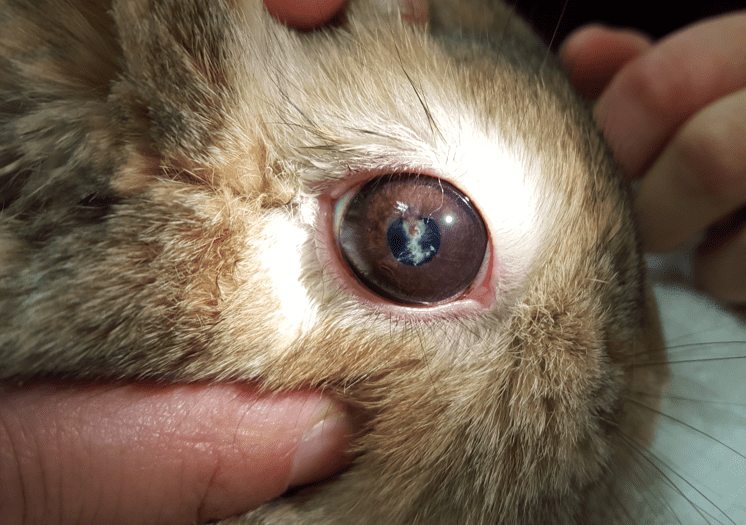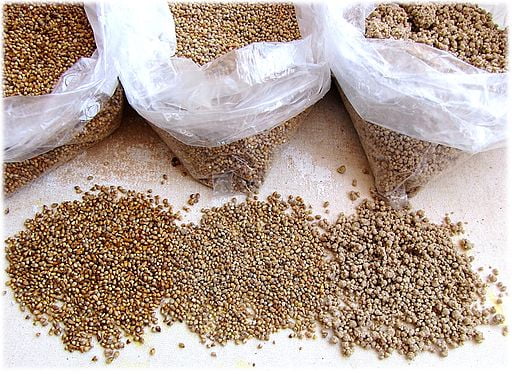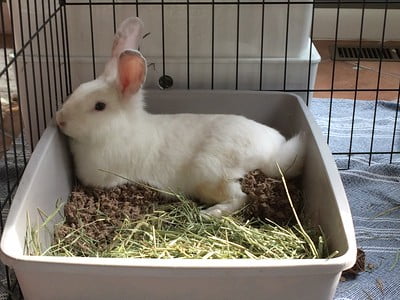Last Updated on February 24, 2023 by Marjon Ramos
Drinking a lot of water in rabbits can be caused by a number of conditions such as dehydration, hot temperatures, diet changes, diabetes, chronic renal failure, lower urinary tract disease, liver problems, E. cuniculi, and clostridial enterotoxaemia.
Now that I’ve given you the gist of the article, read on as I explain in more detail why your rabbit is drinking a lot of water:
Table of Contents
Symptoms of polydipsia in rabbits.
Rabbits that are experiencing polydipsia or increased thirst might be hard to detect.
The reason is that rabbits’ water consumption is highly dependent on their diet.
But here are the few things you should look for when you’re trying to decide whether or not your rabbit is experiencing polydipsia:
- Frequent urination
- Water bowl/bottle is empty more frequently.
- Light-colored urine
- Partially incontinent or having insufficient voluntary control over urination.
Possible reasons why your rabbit is drinking a lot of water.
Increased thirst in rabbits can be particularly worrying, especially if it happens all of a sudden.
Here are the possible reasons why your rabbit is drinking a lot of water:
1. Dehydration
Rabbits that are drinking too much water can be due to dehydration caused by neglect or an illness like diarrhea.
Here are the signs of dehydration in rabbits:
- Dark/smelly urine
- Fever
- Lethargy
- Lack of appetite
- Wrinkled skin
Rabbits that are neglected or not given unlimited amounts of clean drinkable water are susceptible to dehydration.
Most rabbit owners underestimate the amount of water their rabbits need.
Remember, rabbits drink 50-100 mL/kg of water every 24 hours. The amount I mentioned is highly dependent on your rabbit’s diet.
For rabbits that are eating a lot of protein or dried fibrous food, their water intake is higher.
So it’s much better to let your rabbit decide on how much water they need for the day and just give them a lot.
As for dehydration caused by diarrhea, it’s likely due to a wrong diet or you changing your rabbit’s diet too fast.
Here are the signs of diarrhea in rabbits:
- Small, watery, foul-smelling feces.
- Soft feces sticking to fur.
- Loss of appetite
- Decreased water intake
- Lethargy
If you notice one or more of the following symptoms, bring your rabbit to a veterinarian. Diarrhea in rabbits can be fatal if not treated immediately.
2. Hot temperatures
Your rabbit might be drinking a lot of water because they are overheating or having a heatstroke.
Because rabbits don’t have any sweat glands (except for a few on their lips), they are more prone to heatstroke, especially in the summer.
Also, rabbits cannot pant like dogs to signal to their owners that it’s too hot because rabbits primarily breathe through their noses.
Here are the most common symptoms of heatstroke in rabbits:
- Rapid breathing
- Gasping for air
- Loss of appetite
- Bluish or grey lips
- Exhaustion
Here are some things you can do to protect your rabbit from heatstroke and what you can do if they already have it:
- Never place your rabbit in direct sunlight.
- Place a bottle of cold water wrapped in towel near them during the summertime.
- Provide them with shade when they are outside.
- Wrap your rabbit’s body with a moistened towel. Don’t wrap their ears because it helps them regulate the temperature.
- Don’t soak your rabbits in water if you suspect them of heatstroke because it could provoke shock.
3. Chronic renal failure
Chronic renal failure could also lead to increased thirst in rabbits. This type of renal failure is slower and would progress slowly over longer periods of time.
Chronic renal disease can be caused by a number of reasons, such as:
- Trauma
- Prolonged ARF
- Tumors
- Urinary tract obstructions
- Diabetes
- Infections (E. cuniculi)
- Poor diet (very high dietary calcium intake, vitamin D toxicity)
- Aging
- Cancer (lymphoma, renal carcinoma)
- Cysts (renal cysts)
- Dehydration
- Dental disease
Here are the symptoms that your rabbit might be suffering from chronic renal failure:
- Inappetence
- Polydipsia
- Polyuria
- Weight loss
- Aneamia
- Lethargy
4. Lower urinary tract disease
Lower urinary tract disease can also lead to increase thirst. Most of the time, LUTD is caused by the following:
- High calcium diet
- Loss of balance (middle ear disease, encephalitozoonosis)
- Loss of mobility (spinal pain, hip pain, or abdominal pain).
Here are the signs that your rabbit is suffering from LUTD, according to the Textbook of Rabbit Medicine:
- Urine scalding
- Pain on urination
- Loss of litter training
- Polydipsia/polyuria
- Gut stasis
- Hunched posture
- Visual changes in urine (color change, presence of blood, increased turbidity or clarity)
5. Liver problems
Liver disease or damage can also lead to excessive thirst. As an example, in rabbits that are suffering from hepatic lipidosis or fatty liver disease, can lead to dehydration, which can increase thirst.
Rabbits that are having liver problems will have the following symptoms:
- Jaundice (yellow discoloration of the white part of the eyes)
- Anorexia or loss of appetite
- Diarrhea
- Pain (loud teeth grinding, hunched body posture, depression, lethargy)
- Neurological signs like confusion and clumsiness
You can read more about liver diseases in rabbits here.
6. Diet changes
Diet changes can also lead to increased thirst because rabbits’ water requirements are highly dependent on what food they eat.
As an example, rabbits that are eating a lot of high-water-content vegetables may not drink any water at all.
While rabbits that are on diets that are fibrous, salty, and dry would need to drink more than usual. This type of diet tends to absorb water in the intestinal tract, which can increase thirst.
7. Behavioral
Your rabbit might also be drinking water more than usual because they are marking their territory. This is more common when one or both rabbits are unneutered.
Unneutered rabbits will likely become territorial once they reach sexual maturity. That’s why rabbits should be neutered to prevent this problem.
Be careful when your rabbits are doing this. The dominant rabbit would likely hoard all the water and food and would not let the submissive rabbit eat or drink.
A rabbit that’s not drinking or eating could develop serious health problems like GI stasis and dehydration.
8. Clostridial enterotoxaemia
Excessive thirst in rabbits can also be caused by clostridial enterotoxaemia. Enterotoxaemia is a fatal condition caused by rabbits that are fed a high-carbohydrate diet, especially young rabbits.
Most rabbits that are suffering from this condition will not survive treatment.
Signs that your rabbit is suffering from clostridial enterotoxaemia:
- Diarrhea
- Anorexia
- Polydipsia, or increased thirst
- Cyanosis, or bluish discoloration of the skin due to lack of oxygen or circulation.
- Tooth grinding
- Hypothermia
- Recumbency (paralysed)
- Seizures
9. E. cuniculi

Encephalitozoon cuniculi or E. cuniculi could also increase thirst in rabbits. E. cuniculi, a parasite that infects the eyes and nervous system, is one of the major causes of blindness in rabbits.
Within a month of exposure, E. cuniculi can infect the rabbit’s eyes and brain.
E. cuniculus is a serious condition that should be looked at by a veterinarian.
With enough time, your rabbit’s eye could develop cataracts, severe inflammation, redness, and swelling of the eye.
If your rabbit is not treated immediately, it could lead to permanent blindness and even death.
Here are the signs that your rabbit might be suffering from E. cuniculi:
- Mascular weakness
- Emacipation
- Excessive thirst or polydipsia
- Excessive urination or polyuria
- Occasional neurological signs
10. Diabetes
Diabetes in rabbits is extremely rare compared to humans, cats, and dogs.
Diabetes in rabbits is barely mentioned in literature because it’s so rare. In fact, most veterinarians have never encountered a true case of diabetes in a rabbit.
There are two types of diabetes in rabbits:
- Type 1 – Type 1 diabetes happens when a rabbit’s pancreas does not produce enough insulin. This type of diabetes is extremely rare, with the exception of some strains of New Zealand white rabbits.
- Type 2 – Type 2 diabetes in rabbits happens when the rabbit’s cells develop a resistance to insulin. This type of diabetes in rabbits is more common in obese rabbits.
Signs of diabetes in rabbits:
- Hyperglycemia
- Excessive thirst or polydipsia
- Excessive urination or polyuria
- Excessive eating or polyphagia.
The only way to truly know if your rabbit is suffering from diabetes is to take them to a veterinarian and ask for a blood test.
How much water should a rabbit drink?
According to Brewer and Cruise (1994), rabbits normally drink 50–100 mL/kg every 24 hours. But the amount I mentioned above is highly dependent on your rabbit’s diet.
Rabbits that are eating a lot of fresh green vegetables may not drink water at all because most of these plants are already high in water content.
While rabbits that are on a high protein diet need to drink more water than 50-100 mL/kg every 24 hours.
Finally, rabbits that are eating a lot of fibrous, salty, or dry foods tend to drink more water than usual. This type of food absorbs water in the intestinal tract, which can increase thirst.
Can rabbits die from drinking too much water?
No, rabbits would never drink too much water for them to die from it. Increased thirst in rabbits is a symptom of a larger problem.
If your rabbit is drinking more water than usual, it’s best that you observe them for a while and see if other symptoms would show up. Drinking too much water can be caused by a simple diet change or a change in temperature.
Or it could be a life-threatening condition like kidney and liver failure. Always consult your veterinarian if you have any doubts about whether or not your rabbit is healthy.
Cite this article:
Sources
Image credit – Rabbit Vet, CC BY-SA 4.0 https://creativecommons.org/licenses/by-sa/4.0, via Wikimedia Commons, “20130629_1k Grey rabbit + lil pink tongue drinking | Utah” by Josefine S.




